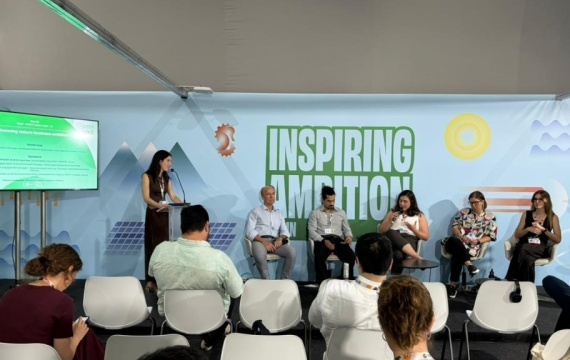Companies and Experts Discuss Nature Positive Ambition in COP30 Panel
On November 18, the panel “Advancing Nature Business Ambition”, held at the Spain Pavilion in the Blue Zone, brought to COP30 a discussion on how to transform business models to incorporate regenerative practices and align corporate strategies with the global biodiversity agenda.
The session began with an introduction to the Nature Positive concept, which proposes replacing the traditional model of unlimited resource consumption with a regenerative approach, recognizing that there is no viable economy without nature and that business success depends directly on ecosystem preservation.
The panel featured Marina Esteves, researcher at the Center for Sustainability Studies (FGVces), who shared her experience working on sustainability with small and medium-sized Brazilian companies integrated into the supply chains of major European corporations. According to Marina, the project involved indicators, training cycles, evaluations, and workshops, resulting in significant progress in adopting practices and improving knowledge about circular economy. “This work shows that it is possible to engage smaller companies in global sustainability standards, strengthening value chains and amplifying positive impacts,” she emphasized.
Neoenergia presented its approach based on three pillars: climate change, biodiversity, and circular economy, highlighting the use of the TFD framework to guide its practices.
Another example was the Mapfre Forest Project, which promotes the restoration of different Brazilian biomes, increasing connectivity between ecosystems and species, while generating social benefits and enhancing corporate reputation.
The discussion also addressed the need to identify risks and dependencies related to biodiversity, as required by the Convention on Biological Diversity (CBD). Experts warned about gaps in corporate reporting and the disconnect between discourse and actual data disclosed.
The panel concluded that overcoming these barriers will require integrating innovation, technology, and financial reporting aligned with sustainability, which will soon become mandatory in Brazil, driving corporate action.
Full coverage of Fundação Getulio Vargas’ participation in COP30, including agendas, exclusive content, and contributions from the institution’s researchers to global climate action, is available on the FGV Climate Agenda Platform. The opinions expressed in this publication are the sole responsibility of the contributing researchers and do not necessarily reflect the official position of Fundação Getulio Vargas.
